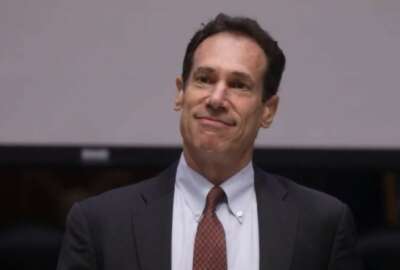

A new Securities and Exchange Commission measure may limit payouts whistleblowers receive as a result of tips about corporate malfeasance.
Best listening experience is on Chrome, Firefox or Safari. Subscribe to Federal Drive’s daily audio interviews on Apple Podcasts or PodcastOne.
The Securities and Exchange Commission regularly points out how many millions of dollars whistleblowers receive as a result of tips about corporate malfeasance. Yet it has a rule in the offing that would limit the largest payouts. This is a big puzzle to the whistleblower community. For more, Federal Drive with Tom Temin turned to Executive Director of the National Whistleblower Center John Kostyack.
Interview transcript:
Tom Temin: John, good to have you back.
John Kostyack: Hey, good morning Tom.
Tom Temin: Tell us about this rule. First of all, what do we know about it?
John Kostyack: Well, the rule was proposed two years ago, and it has a number of provisions in it, but we’ve been focusing on just a handful of them which we think are a serious threat to what otherwise is a beautiful whistleblower program. And we’re like you a little bit mystified about the intent behind these proposals because they would do serious damage to what has been a great success.
Tom Temin: Well would it simply put a dollar cap on payouts because right now, I guess these are called qui tam settlements, are a percentage of whatever it is the government recovers so it’s not even as if appropriations are being spent. It’s just a portion of the reward, or the fine and penalty is diverted to the whistleblower.
John Kostyack: Yeah, and that’s right. That’s one of the two main provisions we’ve been focused on the cap on rewards. Congress puts a statutory percentage in the legislation. And the idea behind having a clear percentage is whistleblowers have a roadmap. There’s some predictability. So if you’re a high level executive, well compensated, accustomed to that high level compensation and considering about exposing wrongdoing. And you see that the SEC is now getting hostile to large awards, you may reconsider submitting information. This almost is like SEC sending a message, we’re not interested in the biggest cases, which is strange, because we have celebrated many successes with them on a large scale corporate fraud being exposed by whistleblowers, and we don’t want that to end so we’ve been fighting this one hard.
Tom Temin: The SEC itself the commissioners recently postponed a vote on it for the second time. Do you think it’s because of whistleblower concern? Or is it because they just don’t agree and don’t want to have something that they can’t get behind unanimously?
John Kostyack: Well, as you know, they don’t share their reasonings for the postponing of meetings, this is the second time they’ve done it without explanation. We can only guess it is some combination of what you alluded to, we have alerted our members of support because fairly large email list to notify the SEC directly of their concerns, and we are proud to say that there have been more comments on this particular rule than any time in the history of the SEC whistleblower program. So perhaps that is it, and we’ve been meeting with the commissioners in person and really raising the temperature. So I think that’s part of it. I do think their chairman probably would like to come up with a decision that is unanimous one, and this one is controversial. So our ultimate hope is that whatever changes they made to the whistleblower program around the margins, and they should not mess with the sort of this key successful compliance of that program.
Tom Temin: Well, is the rule entirely about whistleblowers? Or is the whistleblower and the limit on payouts just a detail of a much larger rule that covers other matters?
John Kostyack: Yeah, the the rule does cover other matters. And we haven’t been weighing in on those. And so there are things in this rule proposal that are completely non-controversial. The other one we do want to call attention to at least a bigger threat as this cap on rewards, is the idea that this SEC is putting out now that if you don’t fill out their prescribed form, known as a TCR, at the very beginning of your disclosure process, you are disqualified from being treated as a whistleblower and receiving a reward. That to us is extremely strange. The SEC actually has other parts of its website where they encourage contacting the SEC in the contact us form. If you were to click on that right now, if this rule were approved, and you clicked on contact us and notify the SEC, of the corporate fraud, you can be done. disqualified from the program because you didn’t fill out the form as your first form of contact. Or if had tried to resolve things internally within your company, that would be a prohibited disclosure that would bar you from the program. So we find that to be very strange too, both that and the cap on rewards seem to be very hostile to the core idea of we want to encourage whistleblowers, they want to make it as easy as possible. And that’s what’s been key to the success of the program so far.
Tom Temin: Just go over that last one one more time. If you try to resolve what you think is the problem with the corporation itself that you’re employed by, then you would not be qualified to become a whistleblower afterwards to the SEC.
John Kostyack: Right. Their proposal is essentially, we want your first disclosure to be through this TCR form. And if disclosure happens in another format that will disqualify. It gives a small opportunity to rectify that apparent alleged procedural violation of law. But it’s a very narrow window, 30 days if to rectify it. Many whistleblowers are not going to be aware of this new requirement and we fear that people with very important evidence of fraud will be disqualified because of that.
Tom Temin: And that’s a slightly different procedure than is expected for people that blow the whistle on federal agency operations — where aren’t you expected to try to resolve it with your supervisor and maybe his or her supervisor and up the chain before you go to say, Office of Special Counsel?
John Kostyack: That’s right. I have to say, in the private sector, there is a benefit to having an independent channel outside of corporations reporting channels, because some of those reporting channels are not very good in terms of protecting whistleblowers. So we don’t have a concern with asking people to go to the government but just don’t disqualify them. If they don’t follow these very precise set of procedures, just ask them to correct how they went forward and make it a friendly amendment process.
Tom Temin: Interesting. Do you have any sort of ally organizations in raising your concerns, let’s say to the SEC?
John Kostyack: Yes, we have had a host of other NGOs and advocates who have weighed in the same place that we have. So if you look at the public record of comments here, it’s quite diverse array of opposition. On the other side, it looks to us like this is a Chamber of Commerce. They have been pushing this particularly the cap on the awards for a long time. They failed in an effort about a decade ago, the SEC voted unanimously against putting a cap on awards. But they’re back again, and they’re pretty tenacious. And so we will have to work hard to make sure this doesn’t go forward.
Tom Temin: Because if there is a percentage that Congress established a range of percentages, I guess that whistleblower can receive to limit that so that it’s below that percentage, that would seem to be contrary to the statute.
John Kostyack: Yeah. Now SEC is not saying they would go below the lowest end of the statutory percentage. What they are saying is we reserve the discretion to lower the award based upon the size of the sanction. And to us linking the award and essentially penalizing you for bringing forward the larger cases is quite odd. It should be almost the opposite. Bring us the largest cases and we promise we will truly reward you.
Tom Temin: And there have been some multi million dollar awards to whistleblowers in recent years. I think there was one just recently that was a couple of million dollars.
John Kostyack: Right. And you can imagine that if you’re a corporate executive sitting on evidence of large scale fraud, you’re paying close attention to that kind of news. You really want to know that there’s a financial lifeline. The most important thing to know about whistleblowing is that retaliation is commonplace, powerful people when they’re exposed retaliate. And so if you’re a corporate executive considering whether to go to legal authorities about violations of the law, you are rightly concerned that that could jeopardize your entire career. And so we fought hard for financial lifelines for people who are willing to take that risk.
Tom Temin: John Kostyack is executive director of the National Whistleblower Center. Thank you for that update.
John Kostyack: Thank you for having me.
Copyright © 2024 Federal News Network. All rights reserved. This website is not intended for users located within the European Economic Area.
Tom Temin is host of the Federal Drive and has been providing insight on federal technology and management issues for more than 30 years.
Follow @tteminWFED


